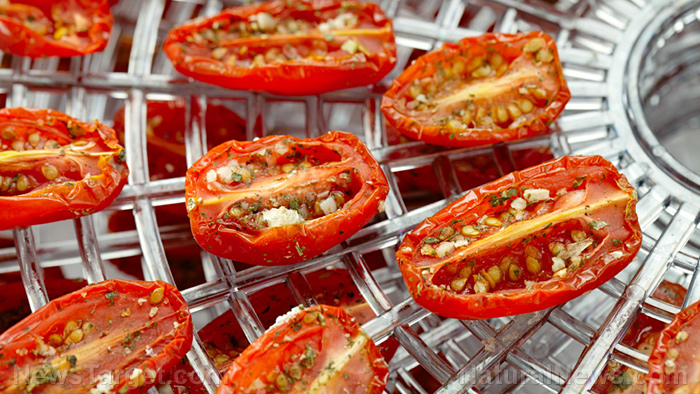
Advertisement
Dehydration is a great food preservation method for preppers who want to save time on food prep or those who want to maximize the limited space in their pantry or stockpile.
If you’re still on the fence about getting a dehydrator, detailed below are 25 reasons to start dehydrating food for your stockpile. (h/t to TheSurvivalMom.com)
Anyone can learn how to dehydrate food
Unlike home canning, you don’t need fancy equipment to dehydrate food. If you’re on a budget, you can get a basic dehydrator for your food prep.
Check recipes and guides online to learn how to dehydrate different food items like fruits and vegetables. (Related: Food supply tips: 5 Food preservation methods to learn before SHTF.)
Dehydrating means you know what is in your food
Dehydrating food for your kids means you can prep healthy snacks without any added sugar or chemicals like additives and preservatives. Since you know what you’re putting in the food, you can be sure that your kids are only eating stuff that’s good for them.
Dehydrated fruits and veggies have intense flavors
Many dehydrated fruits and veggies have more intense flavors compared to fresh produce.
Dehydrating food makes it easy to prep various meals
Learning how to dehydrate food means you can prep various ingredients like apples, veggie chips and even pasta sauce. With the right tools, you can also dehydrate ground beef or canned fruits and veggies.
Dehydrating food produces unique and healthy snacks
If your kids are old enough, you can teach them how to dehydrate their own snacks, which can make snack time exciting for them. Let them choose their preferred ingredients like applesauce fruit leather, apple-cinnamon leather, apple-peach leather or apple-strawberry fruit leather.
A #10 can of applesauce can be used to make a lot of fruit leather for a tasty snack that both kids and adults will enjoy.
You can dehydrate whatever’s in season
Make the most of fruits or vegetables in season by buying in bulk and dehydrating produce for your stockpile or daily use.
Check out bargains and sales at farmer’s markets, food co-ops, fruit stands and pick-your-own-produce farms. Processing in-season fruits and vegetables can help you save more money compared to buying commercially dehydrated foods.
You can eat out-of-season produce year-round
Shop local and in-season and dehydrate food in bulk so you can enjoy out-of-season produce year-round.
You can dehydrate a wide array of foods and ingredients
You can dehydrate almost anything for various dishes like fresh, canned and frozen ingredients.
Many foods taste great when dehydrated
Dehydrated food isn’t bland and boring. Instead, many foods are delicious to eat in their dehydrated form.
Dehydrated foods like apple or banana chips can be eaten without rehydration so you don’t need to add water.
Dehydrated foods retain their nutritional value
You can make sure your family is getting the vitamins and nutrients they need since dehydrated foods don’t lose their nutritional value and maintain water-soluble nutrients.
On the other hand, fresh produce can lose as much as 50 percent of certain nutrients after only several days of refrigeration.
Dehydrating makes herbs last longer
You can save money on groceries by dehydrating herbs at home.
Dehydrating food makes it easier to stock up on ingredients
If you have various dehydrated fruits and vegetables in your stockpile, you don’t have to worry about running out of ingredients while you’re cooking.
Dehydrating food can make it easier to maximize space
If space is an issue, dehydrated foods can be a godsend. You can turn 20 pounds of fresh tomatoes into two large glass jars of dehydrated tomatoes.
You can make the most of sales and bulk deals
Take advantage of sales and bulk deals at the grocery store. With a dehydrator, you can buy in bulk without worrying about wasting the food or the money you spent.
Use dehydrated foods for meal prep
Dehydrated foods can be used to prep complete dehydrated meals in Mason jars or vacuum-sealed for easy meal prep. The next time you’re too busy to cook dinner, serve some Mason jar meals.
Dehydrate meals or snacks for outdoor trips
If you love backpacking, camping or hiking, you can replace or supplement freeze-dried meals and snacks with dehydrated food.
Dehydrated foods can be stored at room temperature
While dehydrated foods can be stored at room temperature, you still need to protect your stockpile against enemies of food storage like humidity and pests.
Dehydrated foods are light, compact and portable
Use your dehydrator to turn a pound of apples into two ounces of dehydrated apple slices.
You can involve kids in the food prep
Teach kids new skills by showing them how to dehydrate their own snacks. Slice the ingredients beforehand or supervise and let your kids try dehydrating food at home.
Food dehydration helps reduce food waste
If you have excess harvest from your garden, dehydrate them to avoid food waste.
Food dehydration adds another layer to your stockpile
Food dehydration adds another layer of food storage to your preps. Before SHTF, you can add more supplies to your stockpile by dehydrating staples like fruits and vegetables.
You can dehydrate food even without electricity
Dehydrating doesn’t require electricity.
Even if you don’t have a dehydrator, you can dry food using other means like:
- Black tarp method
- Fire dehydration
- Outdoor dehydration
- Wood stove dehydration
- Solar dehydrator
You can also make dried herbs by hanging herbs in bunches upside down at home.
It’s easier to make kids eat vegetables in dehydrated form
Young kids will often refuse to eat vegetables, but serving dehydrated foods can help change their minds. Another option is to sneak it into their food by using dried and powdered greens.
You can use a dehydrator on different non-food items
You also use a dehydrator to dry various non-food items:
- Make dog treats for pets with food allergies or sensitivities.
- Preserve flowers and herbs for various craft projects.
- Use a dehydrator as a DIY kiln.
- Make DIY potpourri.
- Turn orange peel into DIY firestarters.
Get a dehydrator to preserve excess harvest from your home garden and add to your stockpile before SHTF.
Visit FoodStorage.news to learn more about food dehydration and other food preservation methods.
Watch the video below about seven beginner tips for food dehydrating.
This video is from the Alex Hammer channel on Brighteon.com.
More related stories:
Food preservation tips: What kinds of food can you dehydrate?
Food storage tips: How to dehydrate foods for long-term storage.
Freeze-drying vs dehydration: Which is the best food preservation method?
Sources include:
Advertisements







